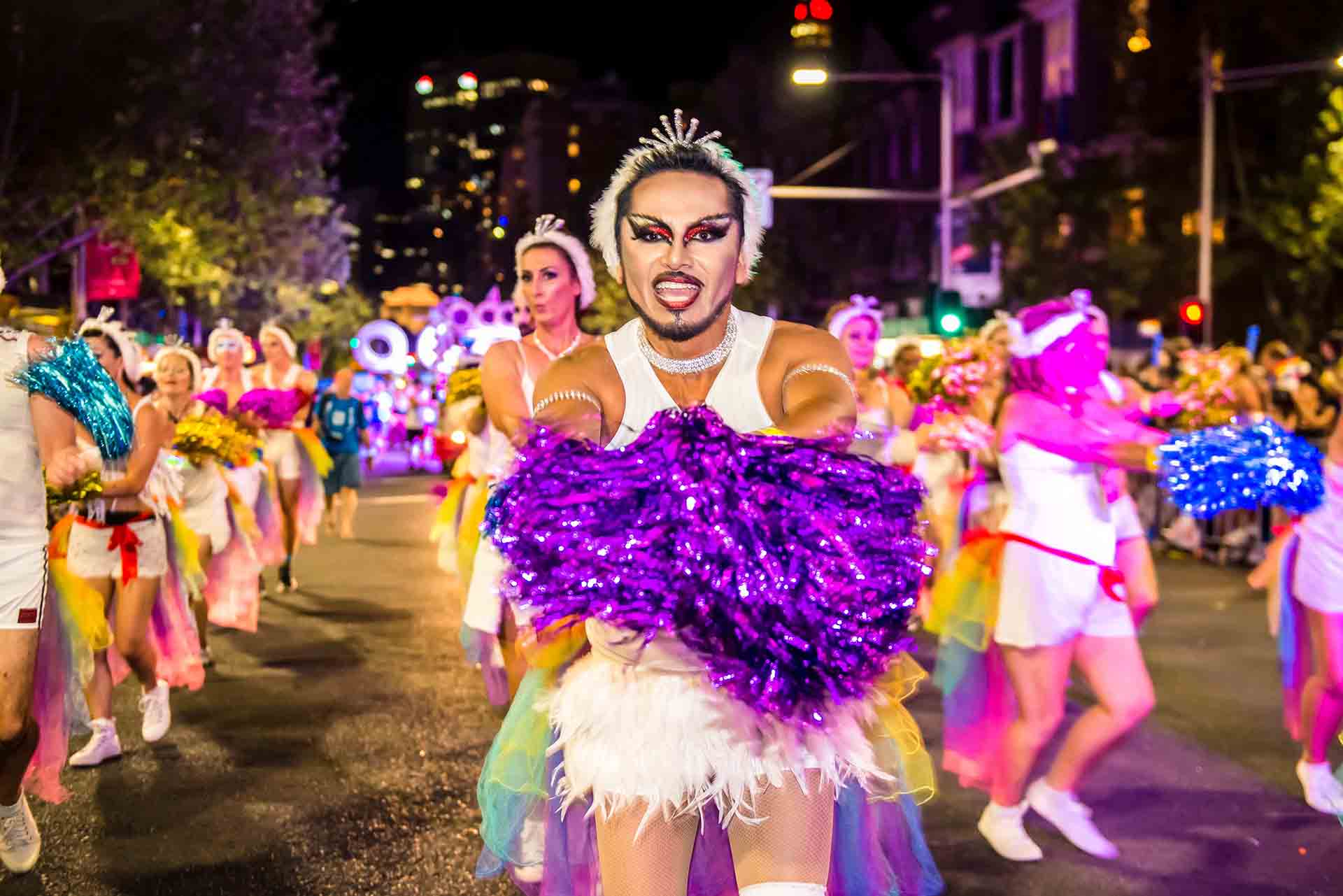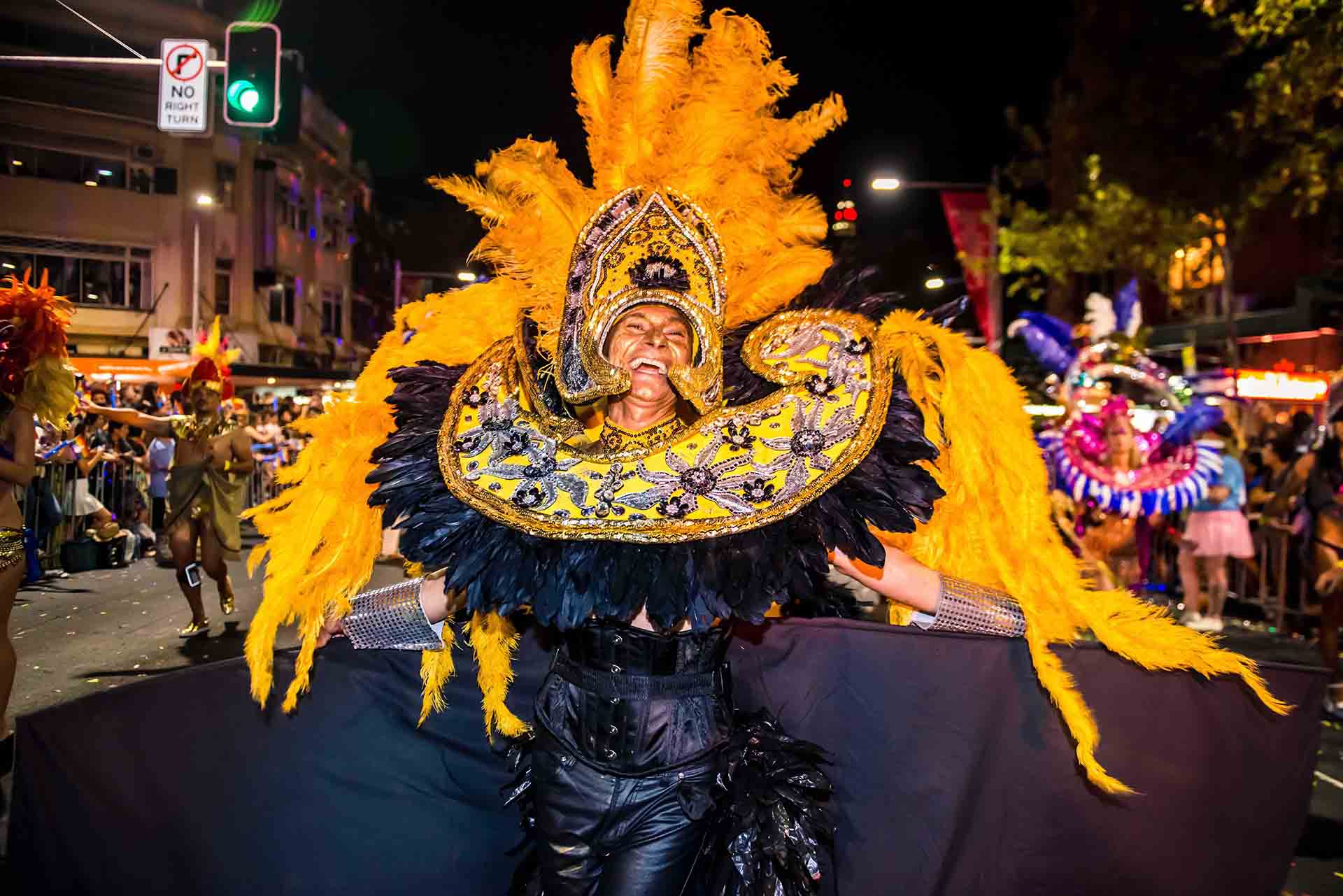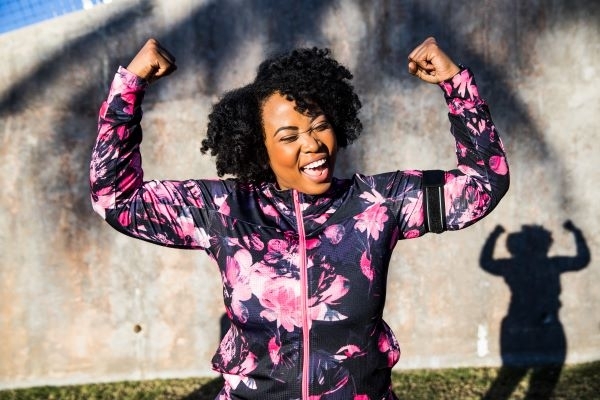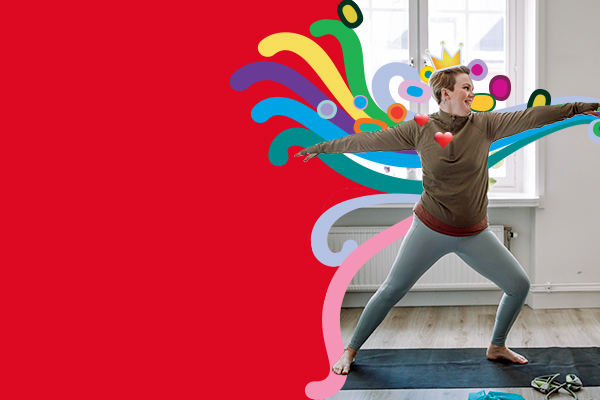-
It started as a street party on a cold winter night, Saturday 24th June, 1978. At 10 pm, a little over 1,000 people gathered on Sydney’s Oxford Street, some in colourful fancy dress, others just rugged up against the chill. They had one truck and a modest sound system, and planned to march towards Hyde Park as part of the international Gay Solidarity Celebrations.
Homosexuality was illegal then – and the police were not thrilled to see such a vibrant display of pride. By the time the marchers reached the park, the celebration was shut down. The truck was confiscated, and 53 people were arrested.
This response was unsettling, but it sparked a renewed urgency for action. Over the next few months, there were more protests, followed by more arrests. But the movement for equality was unstoppable.
The street parade was held again in 1979, and with each following year it grew bigger and bigger, drawing in larger crowds of supporters and building more pressure for law reform. By 1984, the event had moved to summer to take advantage of cheerier weather, a post-parade party had been added, and there were 50,000 people joining in the festivities. By 1993, the glittery crowd had swelled to 500,000.
Today, the Sydney Gay and Lesbian Mardi Gras is one of Australia’s most loved and iconic events – a fun, irreverent month-long showcase of LGBTQI communities and culture. Bringing hundreds of thousands of people together, it’s a confetti-filled space for pride, acceptance and freedom of self-expression.
Along with the colourful costumes, parties, music and dancing, there are over 100 different arts events, including films, exhibitions, talks and forums, encouraging critical thought, inspiring creativity and continuing the activist cause. When the rainbow flag flies above Sydney’s Town Hall, you can be who you are, or whoever you want to be.
This year, there’s a feeling of victory sizzling in the air. The struggle for social change has been long, and it’s definitely not over yet – after all, it wasn’t until 1997 that all Australian states decriminalised homosexuality. There’s no sugar-coating the very real discrimination, prejudice and even violence that LGBTQI people still face, or the devastating impact this can have on mental health and wellbeing.
"Today, Mardi Gras is one of Australia’s most loved and iconic events – a fun, irreverent month-long showcase of LGBTQI communities and culture. Bringing hundreds of thousands of people together, it’s a confetti-filled space for pride, acceptance and freedom of self-expression."
And yet, the passing of the marriage equality bill is a huge milestone – and it’s time to celebrate. Australia is now the 25th country to recognise same-sex marriage, marking a significant step forward in becoming a more inclusive, loving and compassionate place for everyone.
“After such a long campaign which ended up involving every Australian in the quest for equality, we're ready to celebrate, and we had an incredible number of parade applications from all corners of our LGBTQI communities,” says Terese Casu, Mardi Gras CEO.
“Many of them are celebrating hard-won marriage equality, but the parade also draws attention to many other issues involving our communities. The march for equality moves forward, and there's much more work to be done.”
Four decades after the 1978 street party-turned-protest, Mardi Gras is celebrating with the theme of 40 Years of Evolution. “The theme salutes our history of pride, protest, diversity and activism and how they've changed over our four extraordinary decades. We have come so far,” Terese says.
“With the spotlight firmly on our communities and our rights in recent months, this Mardi Gras is also our chance to share 'war stories' and be inspired about what's possible in the future. We're saying, 'Your story is our story, your evolution is our evolution'.”
Terese shares some more reflections on 40 years of love, pride and activism.
Love and protest: 40 years of Mardi Gras


-
Mardi Gras has become such an iconic and culturally significant event. What do you think are some of the reasons for this?
Back in the 1970s, the pervasive myth about gays and lesbians was that they had lonely or sad lives. Mardi Gras became the annual focal point for showcasing LGBTQI communities and culture in a happy, fun, cheeky and life-affirming way. It's a celebration of our identities without fear or shame, and a call to action to improve our lives. In recent years, Mardi Gras has been a global beacon of LGBTQI rights, remembering that many nations of the world still persecute our people.
Over the past 40 years, there’s been some great progress in shifting society’s attitudes towards and acceptance of the LGBTQI community. What do you see as some of the key changes?
40 years ago it was very risky to hold your head up and identify yourself as gay or lesbian. Many of those arrested at the original 1978 Mardi Gras march had their names printed in the newspaper and lost their jobs. It wasn't long ago that viewers would complain about a same-sex kiss on television. And there's still a long way to go in the acceptance and equal rights of transgender and intersex people.
We are seeing LGBTQI people 'come out' at much younger ages, and many same-sex couples raising children. We’re also seeing a broader mix of nationalities and ethnic groups at our events. Especially following the Yes vote on marriage equality, we're realising that most Australians are accepting and believe in a fair go for our communities.
What role do you think Mardi Gras plays in both influencing and reflecting these changes in community attitudes?
In the streets, in venues around Sydney, on television and even on the steps of the Opera House, we're showing the broad diversity, vibrancy and creativity of our communities, in all their walks of life. We see the city promote Mardi Gras as one of its key events of the year, and coverage on SBS sharing not just the floats but a variety of stories behind the various communities involved.
The spotlight on our communities is vital, and one of Mardi Gras' core reasons for being is visibility, so people watching at home from places all across Australia and the world know that they're not alone.
Things are still very far from perfect – there is still plenty of homophobia, transphobia, discrimination and inequality in Australian society. What are some changes you’d like to see for a more inclusive Australia moving forward?
We know that most Australians are welcoming and believe in a fair go for everyone, and that diversity makes communities strong. But we saw many disturbing homophobic and transphobic actions and comments during the marriage equality debate.
We'd love to see more support provided for LGBTQI youth, and more action on building LGBTQI-inclusive aged care facilities, to ensure our elders don't have to 'go back into the closet' when they arrive at an aged care home. There's still a long way to go with the understanding and acceptance of transgender and intersex Australians also, and Australia's treatment of refugees – many of which come from places where gay and lesbian people are persecuted.
What steps can we all take as individuals to help work towards this?
This year's marriage equality debate showed clearly the inspiring things individuals and groups can do in their own families, communities and workplaces. Share your own stories and let people around you know what the issues which affect LGBTQI people mean to you. We hear amazing stories about how one LGBTQI employee of a major corporate began a pride network in their workplace and it has become a significant part of that organisation's promotional activities each year.
There are also amazing pride events happening in smaller centres around Australia now, being welcomed and embraced by their local communities. We encourage people to activate in any way they can, by contacting their local MPs, Senators and councillors, informing them of the issues affecting them. Be out, proud, visible and confident when and where you can.
Medibank is proud to be an official partner of the Sydney Gay and Lesbian Mardi Gras 2018.
Photography: Jeffrey Feng
-
How to set up your bedroom for better sleep
The sleep experts share some secrets.
-
5 healthy habits (and how to keep them)
New Year's resolutions are easy to make and hard to keep. Discover how to make healthy habits for 2024.
-
How to feel more connected this festive season
Feeling stressed or lonely this festive season?
-
Life’s a beach
If you want to take it easy at the beach, start by making the trip easier on yourself. Cameron Williams reveals the discoveries that made his time at the beach more enjoyable.
-
Learn how small bursts of movement can have a positive impact on employee wellbeing
-
How to do a digital detox
Reduce screen time with a digital detox, and improve your mental health and wellbeing.
Subscribe to receive the best from Live Better every week. Healthy recipes, exercise tips and activities, offers and promotions – everything to help you eat, move and feel better.
By clicking sign up I understand and agree to Medibank's privacy policy






